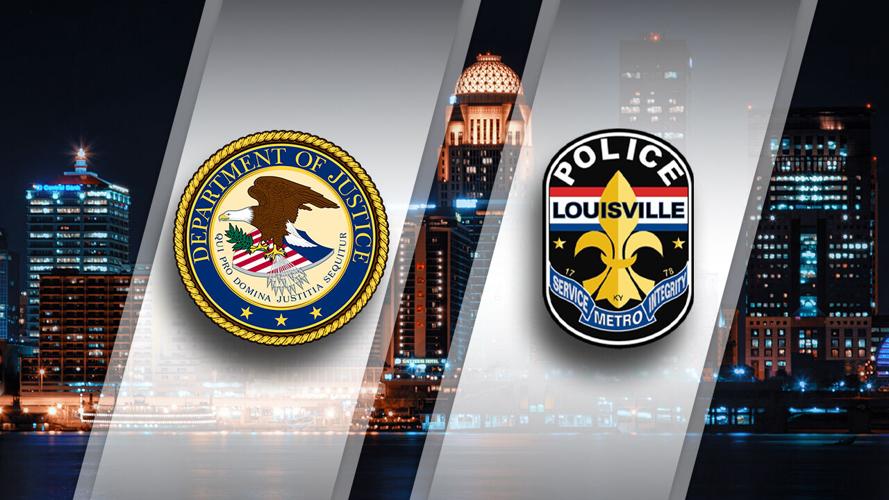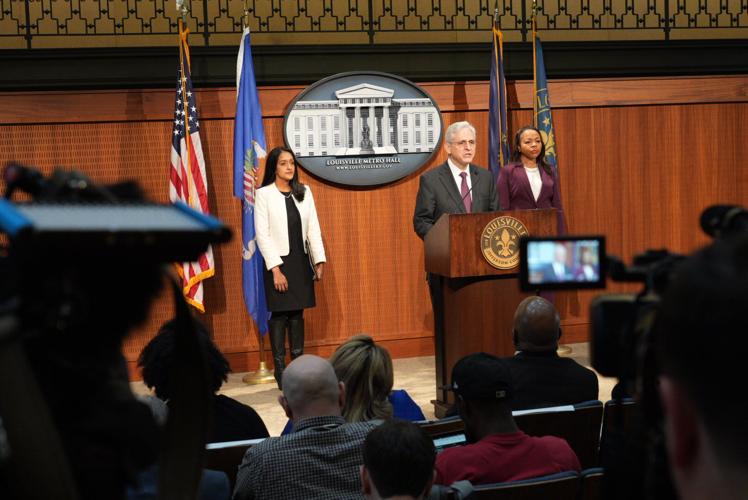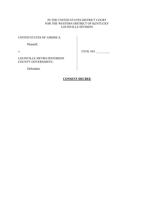LOUISVILLE, Ky. (WDRB) -- The Trump administration moved Wednesday to dismiss a sweeping police reform agreement in Louisville two days ahead of a status hearing in federal court.
The U.S. Department of Justice made the announcement on its website, saying the consent decree for Louisville and other cities "would have imposed years of micromanagement of local police departments by federal courts and expensive independent monitors, and potentially hundreds of millions of dollars of compliance costs, without a legally or factually adequate basis for doing so."
The decree between Metro government and the Justice Department was reached in the final days of the Biden administration but needs court approval to progress.
The decree between Metro government and the Justice Department was reached in the final days of the Biden administration but needs court approval to progress.
The city did not oppose a filing in federal court Wednesday morning by the DOJ requesting the court dismiss the case with prejudice, meaning it cannot be brought back up.
Louisville Mayor Craig Greenberg said at a news conference that he expects U.S. District Judge Benjamin Beaton will approve the request. With that ruling likely, the mayor said the city will implement its own version of the agreement called "Community Commitment — Louisville's Consent Decree."
"This community commitment will lead to the same results we were pushing for in the court-ordered consent decree," Greenberg said, adding that Metro government will hire its own third-party entity to monitor the results. "The goals and objectives are exactly the same."
Asked why the city didn't object to the DOJ's request for dismissal, Greenberg said "we did not oppose because we see the writing on the wall and we need to move forward. We can't afford any more delays. There's no point in delaying the inevitable."
The mayor would not discuss whether he believed the decision was politically motivated.
"While this is not the outcome we'd hoped for ... it is an outcome we planned for," Greenberg said. "We are embracing this opportunity to make LMPD one of the most respected and transparent police departments."
Trump lawyers had hesitated to enact the changes, and the federal judge in the case has expressed concerns about whether court involvement is needed. U.S. Judge Benjamin Beaton hasn't yet ruled on the motion.
While he could deny the DOJ's request, it isn't expected given Beaton has asked if there is a "less intrusive" way to move forward without the court's involvement and asked for more details on how some of the findings were reached.
The DOJ's motion to dismiss shared some of Beaton's concerns, saying not enough evidence has been presented to "justify the drastic intervention."
"After an extensive review by New Department of Justice and Civil Rights Division leadership, the United States no longer has confidence in the strength of its case and no longer believes that the proposed consent decree would be in the public interest," according to the motion.
The agreement stems from a 248-page DOJ report in 2023 that concluded Louisville police and Metro government for years engaged in practices that violated the U.S. Constitution and federal law, including excessive use of force and searches based on invalid warrants.
But on Wednesday, Harmeet K. Dhillon of the Justice Department's Civil Rights Division said: "Today, we are ending the Biden Civil Rights Division's failed experiment of handcuffing local leaders and police departments with factually unjustified consent decrees."
The mayor and Louisville Police Chief Paul Humphrey spoke to reporters at Metro Hall Wednesday morning.
Greenberg said the city will hire an independent monitor to ensure that reforms are made, with a yearly contract renewal process likely to last about five years.
Both Greenberg and Humphrey have said in previous interviews with WDRB News that the city has embraced the reforms, with Humphrey explicitly telling the judge "regardless of whether it's under a consent decree or oversight of federal government ... is going to be striving toward constant improvement."
On Wednesday, Humphrey said he has no doubt his job is on the line when it comes to transforming the department.
"We expect that you will hold us accountable for the work we do," and if the job isn't accomplished, "I will get fired."
Earlier this year, Metro Government urged a federal judge to sign the decree. Wednesday's action seeks to halt consent decrees that were finalized during the final 90 days of the Biden administration, which would include Louisville and Minneapolis.
The DOJ has asked for multiple extensions for filing documents related to the Louisville consent decree in U.S. District Court and earlier this month withdrew six attorneys pursuing the consent decree and replaced them with one attorney, according to court records.
During Trump's first term, the Justice Department attempted to upend an Obama-era consent decree for Baltimore's police department that hadn't yet been approved by a judge by the time the new administration took over.
That effort ultimately failed, with a federal judge in Maryland saying the Justice Department's move to scrap the agreement came too late, according to media reports.
In Wednesday's statement, the DOJ wrote that Louisville and Minnesota were accused of "widespread patterns of unconstitutional policing practices" after an investigation that wrongly equated statistical disparities with internal discrimination.
The mayor said the DOJ has its opinion of the investigation, but that the city accepts the findings of the original report.
In its motion to dismiss, the DOJ noted that the city plans to continue working on the suggested reforms without the court's intervention.
"Micromanagement by an independent monitor, (the DOJ) or a federal court is no longer necessary," according to the motion.
In a statement, U.S. Rep. Morgan McGarvey said he is "appalled and deeply disappointed by the Trump administration's decision to abandon Louisville's consent decree and undermine years of hard work by our community, law enforcement, and city officials."
He said Trump is "playing politics and undermining our nation's fight for racial justice and civil rights, (but) we will continue working to ensure everyone in Louisville is and feels safe."
How we got here
The Biden administration's Justice Department reported the findings of its review March 8, 2023, nearly two years after the 2020 police killing of Breonna Taylor, which prompted both local and national criticism of the police department as well as months of protests.
Greenberg said he has left a message with Taylor's family and hopes to speak with her soon. In a written statement Wednesday, the family's attorney said they're "upset, as can be expected.
"This dismissal is the result of the Mayoral Administration dragging by its feet to finalize the consent decree," the family said. "The investigation concluded in August of 2023 and it took well over a year, at the tail end of President Biden's administration for Mayor Greenberg to sign off on the decree. This city deserves true reform and the city needs to be committed to following through on every single item that they agreed to in the decree. It is up to the residents of this city to hold the police department and the Mayor accountable - and the best way to do that is through our votes."
With a court-ordered consent decree, the city or LMPD would be held in contempt if they refuse or fail to intact the changes. It would also fund an independent monitor who would oversee the police department's progress and report to the court.
The Greenberg's administration previously said it expects the consent decree will be approved by a federal judge and be completed in less than five years. An independent monitor who reports to the court would oversee the police department's progress.
Louisville Metro government and federal officials paused the effort to hire an outside group as they waited to see how Beaton will rule.
The city planned to name the monitor — typically a team of experts in policing, law and other specialties — by the spring. It has agreed to pay no more than $1.475 million annually for an initial two-year term.
Still, Greenberg and Humphrey have pledged they will have independent oversight of the agreement even if it's not a court-mandated process. The mayor proposed $750,000 to fund a monitor position in his budget plan now before Metro Council.
The mayor said progress will be shared with the public and ongoing reports will be available.
Under the agreement, the department would revise its use-of-force and training policies, improve search warrant practices, ensure traffic stops are conducted legally, ensure the fair investigations of police misconduct and address sexual harassment allegations in the department, among other reforms.
The deal addresses 13 specific areas, from traffic stops to officer assistance, and requires police to show "substantial compliance" with the promised changes before each section is satisfied.
In 2023, then-U.S. Attorney General Merrick Garland listed myriad examples of Louisville police misconduct and crimes, such as throwing drinks at pedestrians, racial disparities in arrests and traffic stops, assaulting citizens with disabilities and calling Black people "monkeys, animal and boy."
"This conduct is unacceptable," Garland said on March 8, 2023. "It is heartbreaking. ... It is an affront to the people of Louisville who deserve better."
The federal investigation into LMPD cites 63 different incidents of alleged misconduct, according to an appendix of the 90-page report the DOJ released following their roughly two-year investigation.
Greenberg said LMPD has over the last two years changed over 260 policies, restructured its leadership and created an accountability and improvement bureau, among other reforms.
"We are creating a culture of improvement," Humphrey said. "We are going in the right direction."

U.S. Attorney General Merrick Garland speaks in Louisville to announce that the Department of Justice is putting the Louisville Metro Police Department under a consent decree. March 8, 2023. (WDRB Photo)
This is a developing story and will be updated.
Correction: A previous version of this story incorrectly stated that the mayor had spoken to Breonna Taylor's family. He has reached out to the family and left a message.
Related Stories:
Louisville urges federal judge to sign consent decree to monitor police reform deal
Louisville mayor says outside supervision of police reform deal is 'important' however judge rules
Copyright 2025 WDRB Media. All Rights Reserved.















